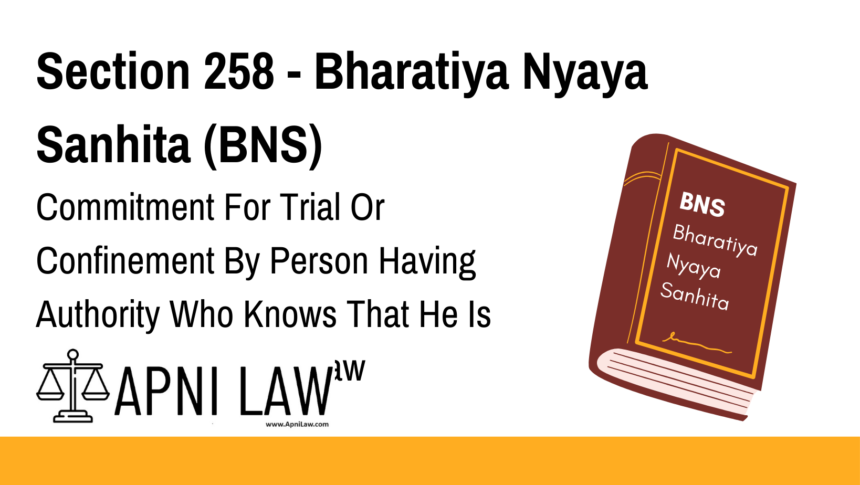Code: Section 258 BNS
Offence: Illegal Commitment or Confinement by Authority
Whoever, being in any office which gives him legal authority to commit persons
for trial or to confinement, or to keep persons in confinement, corruptly or maliciously
commits any person for trial or to confinement, or keeps any person in confinement, in the
exercise of that authority knowing that in so doing he is acting contrary to law, shall be
punished with imprisonment of either description for a term which may extend to seven
years, or with fine, or with both.
Explanation of Section 258 BNS
Section 258 of the BNSS addresses the crime committed by individuals in positions of authority who knowingly abuse their powers to unlawfully commit or confine others. This section is vital for protecting the fundamental rights of individuals against arbitrary detention or trial without proper legal justification.
Key Elements of the Offence:
- Person in Authority: The offender must hold an official position that grants legal authority to commit individuals for trial or to confinement, such as a magistrate, police officer, or prison official.
- Corrupt or Malicious Intent: The act must be committed with corrupt intent or malice, meaning the individual knowingly abuses their power for personal gain or to cause injustice.
- Acting Contrary to Law: The offender must know that their actions are legally wrong, yet proceeds to commit or confine a person without legal grounds.
- Punishment:
- Imprisonment for up to seven years (either rigorous or simple imprisonment).
- A fine, or both imprisonment and fine.
Illustration
Example 1: Illegal Detention by a Police Officer
A police officer detains an individual without proper legal authorization, knowing it violates the law, and keeps them in custody without due process. This act constitutes an offence under Section 258.
Example 2: Unlawful Commitment by a Magistrate
A magistrate orders the trial of an individual without jurisdiction, fully aware that the case should not have been committed to their court. This abuse of authority is punishable under this section.
Common Questions and Answers on Section 258 BNS
1. What constitutes an offence under Section 258 BNS?
- Answer: It involves a person in authority knowingly committing or confining another individual in violation of the law, with corrupt or malicious intent.
2. What is the punishment for committing this offence under Section 258?
- Answer: The punishment can be imprisonment for up to seven years, a fine, or both.
3. Does this section apply to all government officials?
- Answer: Yes, it applies to any public servant with legal authority over the commitment or confinement of individuals, including police officers, magistrates, and prison officials.
Conclusion
Section 258 of the Bharatiya Nyaya Sanhita serves as a safeguard against the abuse of legal authority by public servants. It ensures that individuals are not subjected to unlawful detention or trial, thereby upholding the principles of justice, fairness, and the rule of law.








